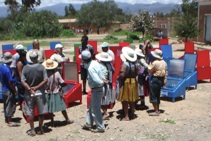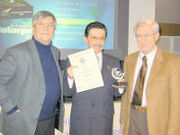Paul Hedrick (talk | contribs) No edit summary |
Paul Hedrick (talk | contribs) No edit summary |
||
| Line 1: | Line 1: | ||
| ⚫ | |||
| ⚫ | The '''CEDESOL Foundation''' believes that there is hope for the many disenfranchised of this world. Our goal is to enrich humanity by equipping people with social and technological tools that permit them to direct their own destinies. All of our activities center around three key concepts; Alternative Education, Renewable Energy and Social Justice. Their founders bring together synergistic experiences unifying business administration, and social sciences with appropriate technology transfer. |
||
| ⚫ | |||
[[File:CEDESOL_training_photo_1.jpg|thumb|350px|Training workshop in Barrio Misericordia on the outskirts of Sucre, 2010.]] |
[[File:CEDESOL_training_photo_1.jpg|thumb|350px|Training workshop in Barrio Misericordia on the outskirts of Sucre, 2010.]] |
||
| ⚫ | The '''CEDESOL Foundation''' believes that there is hope for the many disenfranchised of this world. Our goal is to enrich humanity by equipping people with social and technological tools that permit them to direct their own destinies. All of our activities center around three key concepts; Alternative Education, Renewable Energy and Social Justice. Their founders bring together synergistic experiences unifying business administration, and social sciences with appropriate technology transfer. |
||
| + | |||
==News and recent developments== |
==News and recent developments== |
||
| + | [[File:CEDESOL-_Hausa_Rancho_2-11.jpg_.jpg|thumb|300px|Participants at [[CEDESOL]] Hausa Rancho, [[Bolivia]] solar cooking training.]] |
||
| + | *'''February 2011: New beginnings in Hausa Rancho''' - Nine CEDESOL staff members traveled to the community of Hausa Rancho to deliver 30 solar cookers to the participants in a project sponsored by the [[Kyoto Twist Solar Cooking Society]]. Hausa Rancho, a location with ample sunlight, is located 90 minutes outside the city of Cochabamba, [[Bolivia]]. The Kyoto Twist Solar Cooking Society have subsidized the cost of the solar cookers, and through outside funding from supporting agencies and organizations, CEDESOL is able to further subsidize the solar cookers it sells. Each cooker costs 560 Bs. The original production cost was 1,600 Bs. With this compounded subsidization, each participant pays only 200 Bs to receive a solar cooker, and afterwards participates in five training sessions held every two to three weeks over the course of three months. The staff members arrived mid-morning to begin setting up the cookers, which would be used to prepare lunch for the community, demonstrating the possibilities of solar cooking. The preparation of the meal took around two hours, and participants were amazed with the results, and were enthusiastic to begin using the solar cookers themselves. In coming months, training sessions will be held to further educate the participants on the capabilities of the cookers. Following the training period, the community will keep the solar cookers, with the expected results of lowered carbon emissions, safer cooking methods, and cleaner lives. |
||
| + | |||
[[Image:Metal_Rocket_Stove_Granada_2006.JPG|right|200px]] |
[[Image:Metal_Rocket_Stove_Granada_2006.JPG|right|200px]] |
||
*'''April 2008:''' Under this cooperative agreement with the US Environmental Protection Agency, CEDESOL will scale-up the industrialization process for a uniquely designed wood-burning rocket stove, which is part of our group of Ecological Cookers (a well-sealed solar box cooker based on the ULOG type solar cookers, [[Retained-heat cooking|retained heat cookers]] and the two-burner [[rocket stove]] with chimney). Major improvements are being made in the production process so that 2,000 of these stoves will be produced every month, compared to 300 or 400 per month before the scale-up.[http://www.pciaonline.org/atf/cf/%7B3F7B64BF-ADAD-479B-B81F-AB7C6A5426B8%7D/PCIA-Bulletin-Issue-15.pdf] |
*'''April 2008:''' Under this cooperative agreement with the US Environmental Protection Agency, CEDESOL will scale-up the industrialization process for a uniquely designed wood-burning rocket stove, which is part of our group of Ecological Cookers (a well-sealed solar box cooker based on the ULOG type solar cookers, [[Retained-heat cooking|retained heat cookers]] and the two-burner [[rocket stove]] with chimney). Major improvements are being made in the production process so that 2,000 of these stoves will be produced every month, compared to 300 or 400 per month before the scale-up.[http://www.pciaonline.org/atf/cf/%7B3F7B64BF-ADAD-479B-B81F-AB7C6A5426B8%7D/PCIA-Bulletin-Issue-15.pdf] |
||
Revision as of 20:20, 3 March 2011

Training workshop in Barrio Misericordia on the outskirts of Sucre, 2010.
The CEDESOL Foundation believes that there is hope for the many disenfranchised of this world. Our goal is to enrich humanity by equipping people with social and technological tools that permit them to direct their own destinies. All of our activities center around three key concepts; Alternative Education, Renewable Energy and Social Justice. Their founders bring together synergistic experiences unifying business administration, and social sciences with appropriate technology transfer.
News and recent developments

Participants at CEDESOL Hausa Rancho, Bolivia solar cooking training.
- February 2011: New beginnings in Hausa Rancho - Nine CEDESOL staff members traveled to the community of Hausa Rancho to deliver 30 solar cookers to the participants in a project sponsored by the Kyoto Twist Solar Cooking Society. Hausa Rancho, a location with ample sunlight, is located 90 minutes outside the city of Cochabamba, Bolivia. The Kyoto Twist Solar Cooking Society have subsidized the cost of the solar cookers, and through outside funding from supporting agencies and organizations, CEDESOL is able to further subsidize the solar cookers it sells. Each cooker costs 560 Bs. The original production cost was 1,600 Bs. With this compounded subsidization, each participant pays only 200 Bs to receive a solar cooker, and afterwards participates in five training sessions held every two to three weeks over the course of three months. The staff members arrived mid-morning to begin setting up the cookers, which would be used to prepare lunch for the community, demonstrating the possibilities of solar cooking. The preparation of the meal took around two hours, and participants were amazed with the results, and were enthusiastic to begin using the solar cookers themselves. In coming months, training sessions will be held to further educate the participants on the capabilities of the cookers. Following the training period, the community will keep the solar cookers, with the expected results of lowered carbon emissions, safer cooking methods, and cleaner lives.
- April 2008: Under this cooperative agreement with the US Environmental Protection Agency, CEDESOL will scale-up the industrialization process for a uniquely designed wood-burning rocket stove, which is part of our group of Ecological Cookers (a well-sealed solar box cooker based on the ULOG type solar cookers, retained heat cookers and the two-burner rocket stove with chimney). Major improvements are being made in the production process so that 2,000 of these stoves will be produced every month, compared to 300 or 400 per month before the scale-up.[1]
- May 2007: CEDESOL Intern Program - Week One Report
- April 2007: CEDESOL is working to install 2000 solar cookers and 2500 fuel-efficient, two-burner “rocket” stoves in Bolivia by the end of May. Over the next 12 months it hopes to scale up to 15000 stoves and cookers. CEDESOL contributes to a campaign led by the German aid group GTZ to distribute 100,000 solar cookers, heat-retention cookers, and fuel-efficient stoves by 2010.The GTZ campaign is to be launched during an international seminar in La Paz this month.

Dr. Almada (center) receives the European Solar Prize
- March 2006: Paraguay continues to be an exciting place when it comes to transforming lives through solar energy. Responsible for a long chain of successes are two closely entwined organizations: la Fundación Celestina Pérez de Almada and the CEDESOL Foundation. Led by Professor Martin Almada and engineer Jean-Claude Pulfer, the twin organizations bring solar energy out of the laboratories and universities to people in need. Their projects provide enough solar equipment and training to transform whole villages, creating solar futures in several villages, and bringing those futures into the present, one village at a time. With support from the Swiss Embassy in Paraguay, the Almada-Pulfer team recently supplied solar cooking equipment to two schools for lunch preparation. Solar food dryers will provide out-of-season healthy fruit snacks to students. Dr. Almada was recently awarded a prestigious European Solar Prize from the European Association for Renewable Energies (EUROSOLAR). The award honors his “commitment for the use of renewable energies in order to give people hope and find a way out of poverty.” You can find more information on this award and view a short video of Dr. Almada’s work here.
Mission
The Foundation defines its institutional mission in lines of action that foment positive change in living conditions in disenfranchised populations, promoting the widest possible participation by society in the use of alternative energies to better the quality of life as a manifestation of social and economic justice.
Vision
Quality of life increase while poverty diminishes as communities are collectively edified applying alternative resources through solidarity and harmonious stewardship for the environment, achieved by working together with public and private institutions.
Primary Goal
Improve the quality of life in rural, urban and peri-urban areas by implementing practices that achieve social and economic justice through the efficient utilization of resources, appropriate technologies and alternative energies to achieve sustainable development in Bolivia and South America as a poverty reduction and environmental strategy.
Secondary Goals
- Foment community based micro enterprises especially related to gender and children, to improve the economic conditions of people in specific areas of interest.
- Provide social and technical assistance to other organizations to help them achieve solid management, while preserving the ecology.
- Promote the micro businessman, farmer and or craftsman, their families and rural communities to help them better their lives, homes and communities through holistic sustainable activities.
- Provide advice and training to empower women and children in sustainability.
Activities
- Provide consultations, training courses, workshops and conferences to different interest levels, including elaborating didactical and pedagogical materials related to holistic and sustainable development.
- Promote and commercialize products developed by craftsmen and micro businesses.
- Develop and coordinate activities and mutual cooperation with national and international organizations having similar goals.
Lines of action
- PROALDE - Dehydrated Food Products Program,
- Ecological Cooking Systems Program,
- The Center for Development in Alternative Technologies
- Courses and training workshops
Articles in the media
- September 2010: South-South Technology Transfer in Bolivia: A Solution for Local Health, Forests, and Our Global Climate - Solutions
External Links
- CEDESOL on Facebook: http://www.facebook.com/group.php?gid=50997109472
- Donate to CEDESOL via GiveMeaning. Your $12 donation provides a cooker to a Bolivian family
- April 2010: Recent CEDESOL activities, and upcoming climate summit in Cochabamba, Bolivia
- January 2008: An audio recording of David Whitfield's presentation at the ETHOS Conference in Kirkland, Washington
- August 2007: Final Technical Report on visit to CEDESOL - Miguel Arzate and Katy Berquist
- June 2007: Video showing chicking cooking in a solar cooker during a CEDESOL workshop
- May 2007: Bolivia launches national campaign for clean cooking energy
Contact
David Whitfield
Executive Director
CEDESOL Foundation (Center for Development with Solar energy)
P.O. 738
Cochabamba
Bolivia
Phone/Fax: +591 4 4488187
Mobile: +591 7 742 4269
info@cedesol.org
http://www.cedesol.org
skype ID: solar1bol
Facebook: http://www.facebook.com/group.php?gid=50997109472
Jean-Claude Pulfer
CEDESOL Ingeniería
Mayor Aponte 2579 e/Obispo López
Asunción 1828
Paraguay
Phone: +595 21 623124
Mobile: +595 981 457766
jcpulfer59@yahoo.com
http://www.cedesol.com.py


